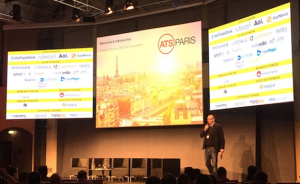ATS Paris: French Ad Tech is Thriving
by Lindsay Rowntree on 15th Apr 2016 in News

Wednesday 13 April saw the sixth annual ATS Paris event take place, proving yet again that French ad tech truly is alive and well. The day kicked off with Ciaran O’Kane, CEO, ExchangeWire, professing his admiration for the French ad tech industry and introducing a packed agenda comprising three keynotes, five panel discussions, and two fireside chats, hearing from a wide variety of speakers, including vendors, agencies, publishers and marketers.
Throughout the day, key challenges within the digital industry were discussed – challenges that are affecting not just the French digital market, but digital markets globally.
A key highlight of ATS Paris was the fireside chat between Anne-Sophie Lizzani, journalist, Offremedia, and Pierre-Louis Fontaine, head of digital media/data, Ford France. In his incredibly candid and jargon-free responses, Fontaine stressed that, as an industry, we need to become as diligent as we possibly can – and that is not the case right now. Fontaine also discussed transparency and how, as a marketer, it is one of his key requirements; but that he is not getting transparency within data or programmatic. Fontaine received an incredible reception from the 500-strong audience, only reinforcing how important it is for marketers to be given the opportunity to be part of the conversation.
The DMP panel discussion between Vincent Luciani, co-founder and managing director, ARTEFACT; Hein van der Wielen, buyer & online strategist, Greenhouse Group (GroupM Connect); Milena Koralczyk, marketing manager, M Publicicté-RégieObs, Groupe Le Monde; and Mathieu Roche, head of global business development, Weborama, moderated by Ciaran O’Kane, CEO, ExchangeWire, highlighted how much the definition of a DMP is open to interpretation in France. Use cases vary significantly; and, in some instances, brands have been known to use multiple DMPs for different purposes. “Regardless of the definition”, said van der Wielen, “the importance is that we are using [the DMPs] as much as we can”. The panel also discussed reasons why a brand would not invest in a DMP, with reasons cited as lack of education, lack of understanding of ROI, resource challenges, and communication issues between brands and agencies, who may have different reasons for investing in a DMP.
An animated discussion took place between David Pironon, director of sales and operations, Smart Ad Server; Julien Gardes, MD southern Europe & MENA, Rubicon Project; and Sylvain Travers, VP programmatic, Webedia during the ‘Programmatic Monetisation – From the Complete Stack to Header Bidding’ panel, moderated by Alain Sanjaume, advisor. Again, the topic of misinterpreted definitions was raised, this time with regards to header bidding. “I’m worried about the French definition of header bidding – it’s not correct”, said Gardes. Pironon argued that it depends on the configuration of clients or partners. He qualified that Smart AdServer uses header bidding to give extra revenue when it’s in contest with other inventory, but that a lot comes from guaranteed sales, which is a watch point. The discussion shifted to the full stack, with Sanjaume asking the assembled panel about the unspoken yield of the full publisher stack. Travers argued that it is still too early to talk about full-stack solutions: “I haven’t seen a perfect one in terms of mastering different channels. It’s great that Figaro are doing this. Other publishers will go full stack in France soon; it will continue to increase organically. In the meantime, we need more experience, but I would encourage all publishers to do this.”
 The publisher conversation continued with a lively discussion between Arthur Millet, managing director, La Place Media and Philip Boscher, head of marketing and business development, TF1 Publicité digital. Millet and Boscher shared their views on the co-operative principle and why it has been so successful, despite it involving competing publishers. Millet explained that in a sales market that operates on an impression-by-impression basis, having one point of contact across publishers creates maximum impact. Boscher compared the French market to the UK, where all the major players want to lock down their systems: “We are competitors of France Télévisions, but we are very close.” Millet reinforced, “it’s important to highlight that we aren’t in competition. We don’t want to walk all over our publishers; quite the opposite. There’s never been a clash. We have created La Place Media with blind inventory to avoid this.” When the conversation turned to co-ops merging, going public, or expanding cross border to fight against GAFA (Google, Apple, Facebook, Amazon), the consensus was that these just aren’t necessary, or useful, and that the publisher co-op market is in an ideal position as it is.
The publisher conversation continued with a lively discussion between Arthur Millet, managing director, La Place Media and Philip Boscher, head of marketing and business development, TF1 Publicité digital. Millet and Boscher shared their views on the co-operative principle and why it has been so successful, despite it involving competing publishers. Millet explained that in a sales market that operates on an impression-by-impression basis, having one point of contact across publishers creates maximum impact. Boscher compared the French market to the UK, where all the major players want to lock down their systems: “We are competitors of France Télévisions, but we are very close.” Millet reinforced, “it’s important to highlight that we aren’t in competition. We don’t want to walk all over our publishers; quite the opposite. There’s never been a clash. We have created La Place Media with blind inventory to avoid this.” When the conversation turned to co-ops merging, going public, or expanding cross border to fight against GAFA (Google, Apple, Facebook, Amazon), the consensus was that these just aren’t necessary, or useful, and that the publisher co-op market is in an ideal position as it is.
Programmatic TV was a core topic of the day, with James Patterson, GM of UK, The Trade Desk arguing during his opening keynote that the increasingly fragmented viewing habits of the 65-year-old TV industry are a positive thing for the industry as they encourage enhanced targeting and reduced wastage. A subsequent panel discussion between Alia Cherif, manager, business development, SpotX; Thomas Luisetti, director of operations and projects, France Télévisions Publicité; and Arnaud Caplier, managing director, digital lead, OMD, moderated by Michel Juvillier, founder, Juvillier Conseil, saw the conversation turn to how programmatic TV can work in the more complex French market, particularly given the legal implications of one-to-one targeting through the television medium. According to Cherif, despite sellers being very aware that they have a fragmented audience, they aren’t able to evaluate and monetise programmatic TV. Luisette reinforced this point by qualifying that the French market isn’t technically, or legally, ready for programmatic TV, but that this is being worked on. In any case, the opportunity for programmatic TV is huge.
In the ‘cross-device’ panel discussion between Dave Hendricks, managing director UK, LiveIntent; Hossein Houssaini, global head of programmatic solutions, Havas; Anthony Rhind, chief strategy officer, Adform; and Toccara Baker, director, special operations, TubeMogul, the focus was on whether the cookie would cease to exist. Hendricks argued that he’s not sure we want to move entirely away from the cookie: “We need to join it with a piece of deterministic data. Buying audiences within cookie pools might die in mobile, but not on desktop.” Rhind reinforced, “the cookies we rely upon are becoming less effective, but they weren’t very effective anyway. However, they will continue to exist.” Houssani agreed that the cookie won’t die, but that there will be coexistence: “There needs to be a better way to apply the cookie data from the first-, second- and third-party perspective, but we won’t get rid of it.” Baker qualified that by saying that the cookie and cookie usage needs to evolve: “We need to use probabilistic and deterministic data to get scale.”
The day ended on a high note with Ciaran O’Kane, CEO, ExchangeWire, moderating a frank discussion between Alexandra Jarry, director of Seller Cloud, southern Europe, Rubicon Project; Danny Hopwood, vice president solutions and platform operations EMEA, VivaKi; Mathieu Rostamkolaei, vice president, Mozoo Group; and James Prudhomme, managing director EMEA, Index Exchange, about how we can make mobile work. The panel discussed where the issue actually lies, as mobile spend is high, and growing significantly year-on-year. However, the majority of that spend seems to be coming out of Facebook and Google. Hopwood argued that there is stagnation on the publisher and agency side, as marketers are not setting mobile KPIs. Prudhomme made the point that there is a big issue for publishers, as 60% of traffic maybe coming from mobile, but 60% of revenue is not. In a series of questions, O’Kane challenged the panel as to why spends aren’t increasing in the channel and it seems that the mobile challenges the industry thinks exist don’t match the actual issues. Hopwood argued that no KPI will solve the problem, as it exists across the entire value chain: “I can categorically say today that no one is nailing 100% of it.”
Tickets are now on sale for ATS Singapore on 4 July 2016. Find more information here.
ATSDigital MarketingDisplayEMEAMonetisation








Follow ExchangeWire